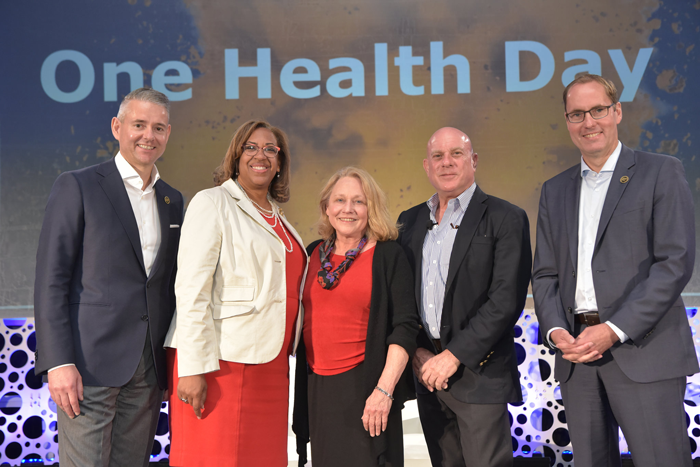
BIOtech Now
Karen Batra
Can we combat disease threats before they even emerge? In the fight against infectious diseases, understanding where outbreaks are most likely to happen and under which circumstances can help us develop tools to address risk to potentially prevent the next pandemic.
This theme was explored at BIO’s International Convention on Monday, June 19, during its “One Health Day” programming, which brought together different parts of the BIO family with sessions focused on issues linking human, animal and environmental health.
The One Health concept examines the connectivity between infectious diseases, the health of plants and animals, the health and safety of the environment and food security issues. All of these play a role in contributing to or controlling and preventing the threat of disease outbreaks. To be effective, prevention mechanisms need to address all of these areas and be put in place cooperatively by government, industry and academia on a global scale.

“Seventy-five percent of emerging diseases such as Ebola or Zika come from animals,” said Senator Al Franken (D-Minn.) via video message. Franken is a sponsor of legislation aimed at breaking down silos between human and animal health programs. “The biotechnology industry has an important role to play here. And your convention is a great example of One Health in action.”
In addition to Senator Franken, session speakers included:
- Dr. William Karesh, Executive Vice President for Health and Policy at EcoHealth Alliance
- Dr. Carsten Brunn, Bayer’s Head of Pharmaceuticals, Americas Region
- Frank Terhorst, Bayer’s Global Head of Seeds
- Dr. Eddie Sullivan, President, CEO and Co-Founder, SAB Biotherapeutics Inc., and Chairman, BIO Food & Ag Section Governing Board (moderator)
- Dr. Laura Kahn, Research Scholar, Woodrow Wilson School of Public and International Affairs, Princeton University and Co-Founder, One Health Initiative
- Dr. Nikos Gurfield, Adjunct Professor of Pathology, UC San Diego and County Veterinarian, San Diego County Vector Disease and Diagnostic Laboratory
- Adrianne Massey, Managing Director for Science and Regulatory Affairs, Food & Agriculture, BIO
- Phyllis Arthur, Managing Director, Infectious Diseases and Diagnostics Policy, BIO
- Joanne Duncan, President, Membership and Business Operations Division, BIO

Dr. Carsten Brunn, Phyllis Arthur, Dr. Adrianne Massey, Dr. William Karesh and Frank Terhorst.
“One Heath action requires the efforts of more than just policymakers, academics and practitioners. It is dependent on engagement, and often leadership, from civil society and the private sector,” said Dr. Karesh, who pointed to international efforts such as The Global Virome Project, a global cooperative scientific initiative aimed at massively lowering the risk of harm from future viral outbreaks over 10 years.
“One Health impacts economic health,” explained Karesh. “The costs associated with a disease outbreak aren’t just healthcare costs, but also the costs associated with loss of trade and social disruption.”
At BIO, we’re working to breakdown the silos between plant, animal and human health to leverage the potential of One Health.
“Biotechnology is inherently interdisciplinary,” said BIO’s Adrianne Massey, “and BIO is a logical home for exploring the One Health concept and addressing the connectivity between animal health and human health.”
Powered by WPeMatico
